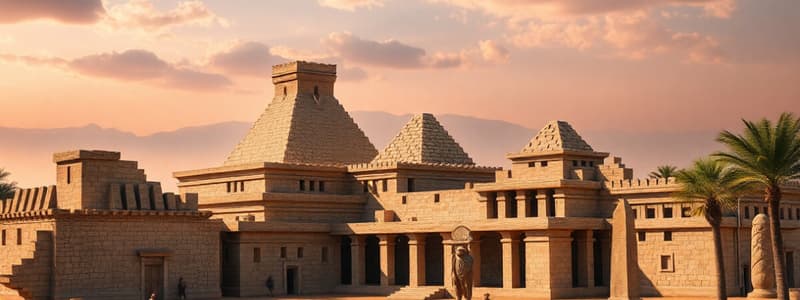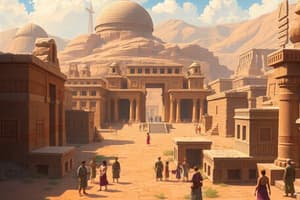Podcast
Questions and Answers
Which philosopher is NOT known for contributing to Western philosophical thought?
Which philosopher is NOT known for contributing to Western philosophical thought?
- Aristotle
- Plato
- Socrates
- Friedrich Nietzsche (correct)
What was a key factor that facilitated the expansion of Ancient Rome?
What was a key factor that facilitated the expansion of Ancient Rome?
- Strong military and political structures (correct)
- Cultural diplomacy
- Religious missionary work
- Geographic isolation
Which civilization is noted for its advanced astronomical knowledge and mathematics in the Americas?
Which civilization is noted for its advanced astronomical knowledge and mathematics in the Americas?
- The Carthaginians
- The Inca Empire
- The Phoenicians
- The Maya (correct)
What contributed to the cultural exchange between ancient civilizations?
What contributed to the cultural exchange between ancient civilizations?
Which major trend did NOT contribute to the organization of large populations in ancient societies?
Which major trend did NOT contribute to the organization of large populations in ancient societies?
What was a significant factor that contributed to the emergence of early civilizations?
What was a significant factor that contributed to the emergence of early civilizations?
Which river was crucial for the development of Egyptian civilization?
Which river was crucial for the development of Egyptian civilization?
Which civilization is known for its city-states such as Ur and Babylon?
Which civilization is known for its city-states such as Ur and Babylon?
What writing system did the Mesopotamian civilization develop?
What writing system did the Mesopotamian civilization develop?
Which civilization is noted for its advanced urban planning, including grid layouts?
Which civilization is noted for its advanced urban planning, including grid layouts?
What characterized the Yellow River civilization's approach to governance?
What characterized the Yellow River civilization's approach to governance?
What was a significant aspect of the ancient Greek civilization?
What was a significant aspect of the ancient Greek civilization?
What caused the mysterious decline of the Indus Valley Civilization?
What caused the mysterious decline of the Indus Valley Civilization?
Flashcards
Ancient Greece
Ancient Greece
The period in ancient Greece from roughly 800 BCE to 146 BCE, marked by significant advancements in philosophy, mathematics, science, literature, and theater.
Conquest
Conquest
The process of conquering and taking control of other territories, often leading to the expansion of empires.
Cultural Exchange
Cultural Exchange
The systematic exchange of goods, services, and ideas between different cultures and societies.
Empire Building
Empire Building
Signup and view all the flashcards
Culture
Culture
Signup and view all the flashcards
Early Civilizations
Early Civilizations
Signup and view all the flashcards
Agriculture and River Valleys
Agriculture and River Valleys
Signup and view all the flashcards
Mesopotamian Civilization
Mesopotamian Civilization
Signup and view all the flashcards
Egyptian Civilization
Egyptian Civilization
Signup and view all the flashcards
Indus Valley Civilization
Indus Valley Civilization
Signup and view all the flashcards
Yellow River Civilization
Yellow River Civilization
Signup and view all the flashcards
Ancient Greek Civilization
Ancient Greek Civilization
Signup and view all the flashcards
Greek Democracy
Greek Democracy
Signup and view all the flashcards
Study Notes
Early Civilizations
- Early civilizations arose independently in diverse regions, spurred by agriculture and favorable geography.
- Key examples include Mesopotamia, Egypt, the Indus Valley, and the Yellow River valley.
- These civilizations displayed complex social structures, writing systems, and impressive architectural achievements.
- Agricultural advancements facilitated settled communities and population growth.
- River valleys often provided fertile soil and reliable water, crucial for agriculture.
Mesopotamian Civilization
- Located between the Tigris and Euphrates rivers.
- Famous for city-states like Ur and Babylon.
- Developed cuneiform, one of the earliest writing systems.
- Showed significant progress in mathematics and astronomy.
- Featured a complex polytheistic religious system.
- Experienced cycles of stability and conflict.
Egyptian Civilization
- Developed along the Nile River.
- Characterized by a unified kingdom ruled by a powerful pharaoh.
- Renowned for magnificent pyramids and monumental architecture, serving as tombs and religious monuments.
- Created a hieroglyphic writing system.
- Demonstrated a hierarchical social structure, with the pharaoh at its apex.
- Held strong beliefs in the afterlife and elaborate burial rituals.
Indus Valley Civilization
- Located in the Indus River valley (modern Pakistan and northwest India).
- Showcased sophisticated urban planning, including grid layouts and sanitation systems.
- Evidence points to a well-organized, centralized government.
- Developed a unique script, still largely undeciphered.
- Possessed advanced knowledge of metallurgy and trade.
- Experienced a mysterious decline and disappearance.
Yellow River Civilization
- Developed along the Yellow River in China.
- Known for the evolution of Chinese writing.
- Saw significant agricultural advancements, leading to settled communities.
- Early dynastic periods emerged, with rulers asserting divine authority.
- Established cultural foundations influencing later Chinese civilization.
Ancient Greek Civilization
- Flourished in the Mediterranean, profoundly shaping Western thought, art, literature, and philosophy.
- City-states, or polis, were centers of governance and culture.
- Developed democracy, citizenship, and political philosophy, progressing from monarchy to more representative forms.
- Influential philosophers like Socrates, Plato, and Aristotle contributed to Western thought.
- Made advancements in mathematics, science, and medicine, laying the groundwork for later progress.
- Showcased masterful achievements in literature and theater, with authors like Homer and playwrights like Sophocles and Euripides.
Ancient Roman Civilization
- Originating in Italy, expanded into a vast empire encompassing Europe, North Africa, and the Middle East.
- Powerful military and political structures fueled territorial expansion.
- Developed a complex legal system influencing later legal traditions.
- Famous for engineering feats, including roads, aqueducts, and public buildings.
- Transitioned from a Republic to an Empire.
- Extensive trade networks nurtured cultural exchange and economic growth.
- Left a lasting impact on language, architecture, and law across Western Europe and beyond.
Other Ancient Civilizations
- Other civilizations, like the Phoenicians, Persians, and Carthaginians, facilitated trade, navigation, and cultural exchange on a global scale.
- The Maya in the Americas demonstrated advancements in astronomy, mathematics, and city-state development, showcasing independent civilization.
- In South America, the Inca Empire developed complex agricultural systems and extensive road networks.
General Trends
- Writing systems enabled record-keeping, administration, and knowledge transmission.
- Agricultural advancements boosted population growth and labor specialization.
- Interactions through trade and conquest spurred cultural exchange.
- Political structures, evolving from city-states to empires, facilitated the governance of large populations.
- Diverse religious and philosophical beliefs shaped societal laws and customs.
Studying That Suits You
Use AI to generate personalized quizzes and flashcards to suit your learning preferences.




